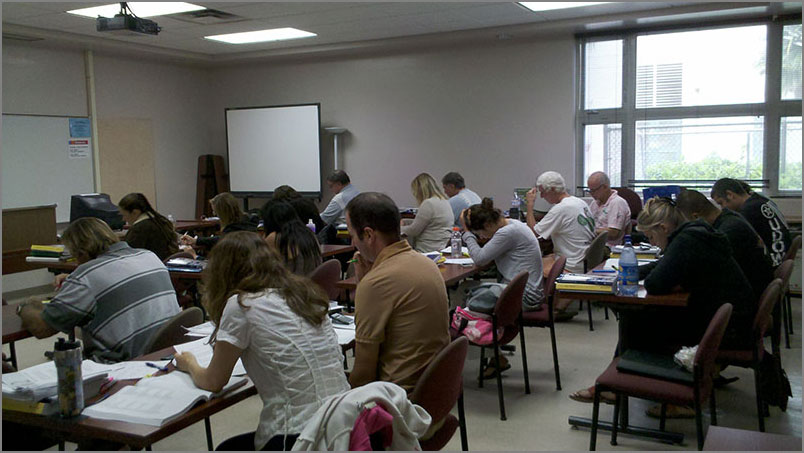What Courses Are Available at a Real Estate Institution? A Full Overview for Aspiring Brokers
Aspiring property representatives have a varied selection of training courses available to enhance their expertise and skills. These offerings range from fundamental courses in real estate concepts to specialized training in areas like residential or commercial property administration and business realty. Recognizing the various educational courses can be vital for success. What necessary subjects and techniques will these training courses cover, and how might they form an agent's job?
Understanding the Essentials: Real Estate Principles
The structure of realty understanding depends on recognizing its principles. These principles encompass crucial ideas that govern the purchasing, selling, and administration of homes. Trick subjects consist of residential or commercial property ownership, land use, and the various civil liberties connected with ownership. Understanding the differences between household, business, and industrial residential or commercial properties is essential, as each classification has special market dynamics.
Furthermore, pupils learn more about market evaluation, which involves assessing home values and patterns to make informed decisions (Real Estate School). Property principles likewise cover the significance of agreements and the legal framework that supports property purchases. Knowledge with financing options, such as loans and home mortgages, is essential for guiding the financial facets of property. Overall, a solid understanding of these principles equips hopeful representatives with the foundational expertise necessary to prosper in the competitive property industry, leading the way for further specialized training and licensing

Licensing Demands and Exam Preparation
Hopeful property agents have to browse details licensing requirements to exercise legitimately in their respective states. These demands typically include completing a marked variety of hours in pre-licensing education and learning, which covers necessary subjects such as real estate regulation, principles, and home monitoring. Prospects have to likewise pass a state examination that evaluates their expertise and understanding of these subjects.
Examination prep work is important for success. Lots of genuine estate colleges supply test preparation programs that offer method questions, research overviews, and testimonial sessions. These sources assist prospects acquaint themselves with the test layout and content. In addition, joining study hall or making use of on-line systems can improve finding out via joint testimonial and conversation.
As soon as the examination is passed, representatives need to use for their certificate with the state's property payment, commonly come with by history checks and charges. Satisfying these licensing needs assures that agents are geared up to offer clients efficiently and ethically in the property market.
Specialized Courses: Residential Or Commercial Property Administration
Comprehending the intricacies of property management is important genuine estate professionals looking for to improve their competence in this specific field. Residential or commercial property monitoring training courses supply agents with useful insights right into the everyday operations of taking care of property and industrial residential properties. These courses normally cover vital topics such as tenant relationships, lease contracts, and building maintenance.
Furthermore, striving property managers find out about monetary management, including budgeting and rent out collection methods, as well as lawful responsibilities associated to renter civil liberties and residential property policies.
Courses may likewise check out advertising and marketing strategies for bring in lessees and tools for building management software application that simplify operations. By completing specialized home management programs, property professionals can much better furnish themselves to manage the obstacles of managing buildings efficiently, inevitably causing enhanced customer contentment and business development. This understanding is essential for those intending to succeed in the affordable genuine estate market.
Commercial Property: A Different Point of view
Industrial property operates under distinct market dynamics that differentiate it from properties. Comprehending financial investment approaches certain to this industry is important for success, as is acknowledging the significance of networking opportunities offered to professionals. These components together form a comprehensive strategy to going across the intricacies of commercial realty.
Distinct Market Dynamics

Investment Strategies Described
Many financial investment methods exist within the domain of industrial real estate, each customized to fulfill particular economic objectives and market problems. One typical strategy is value-add investing, where investors acquire underperforming homes, boost their worth through restorations, and subsequently increase rental revenue. An additional approach is core investing, concentrating on maintained, top notch properties in prime locations that supply stable cash money flow. In addition, opportunistic investing includes greater risk, targeting buildings requiring substantial redevelopment or in arising markets. Realty investment company (REITs) provide a more easy method, enabling individuals to spend in a diversified portfolio of business residential properties. Lastly, crowdfunding platforms have actually arised, allowing little capitalists to take part in bigger industrial bargains, equalizing access to the commercial real estate market.
Networking Opportunities Available
In the domain of genuine estate investing, developing a durable expert network can considerably enhance chances for success. Networking opportunities are plentiful at property institutions, where ambitious agents can connect with market specialists, teachers, and fellow pupils. Workshops, seminars, and guest lectures commonly include knowledgeable agents and brokers that share understandings and experiences, offering vital contacts. Numerous schools also facilitate regional meetups and networking occasions, encouraging trainees to engage with the more comprehensive actual estate area. Additionally, on-line platforms and forums related to these programs permit for recurring interaction and partnership. By leveraging these opportunities, trainees can cultivate partnerships that may bring about mentorship, collaborations, and potential work positionings, eventually aiding in their professional growth within the competitive commercial property field.

Property Investment Approaches
Genuine estate financial investment strategies differ significantly, encompassing approaches such as rental property financial investments, flipping houses, and involving with Realty Investment Company (REITs) Each method offers special chances and risks that investors have to meticulously consider. Understanding these choices is important for anybody looking to develop an effective property profile.
Rental Residential Property Investments
Numerous capitalists locate rental building financial investments to be an engaging strategy for building wide range and creating passive revenue. This approach entails purchasing commercial or domestic homes to rent to renters, ensuring a constant money circulation. Successful rental residential property investments need thorough marketing research, evaluating building values, and comprehending local rental need. Investors often profit from tax advantages, such as depreciation and mortgage interest read more reductions. In addition, home monitoring skills are crucial for preserving lessee connections and making certain timely rental fee collection. Long-term recognition of residential or commercial property worths can even more enhance an investor's portfolio. In general, rental building financial investments can offer a stable income and add to financial safety and security, making them an eye-catching option for lots of in the realty market.
Flipping Houses Strategies
Turning residences has become a preferred method genuine estate investors seeking quick returns on their investments. This method involves purchasing undervalued homes, making essential restorations, and selling them at a higher rate. Effective residence flippers generally conduct thorough market study to identify encouraging areas and buildings with possibility for gratitude. They often concentrate on cosmetic upgrades, such as bathroom and kitchen remodels, to improve allure without spending beyond your means - Real Estate School. In addition, understanding funding alternatives and managing spending plans are crucial for making best use of revenues. Time is essential in this technique, as long term renovations can wear down revenue margins. Ultimately, turning residences calls for a mix of market expertise, remodelling skills, and financial acumen to be effective in a competitive realty landscape
REITs and Diversification
Straight home financial investment can generate high returns, Real Estate Financial Investment Trust Funds (REITs) provide a compelling alternative that enables financiers to expand their profiles without the complexities of handling physical properties. REITs are companies that possess, run, or discover this financing income-producing realty throughout different markets, including domestic, industrial, and industrial residential or commercial properties. By investing in REITs, individuals can obtain exposure to realty markets without the demand for substantial resources or direct monitoring responsibilities. This financial investment automobile likewise offers liquidity, as shares can be conveniently acquired and offered on stock exchanges. Furthermore, REITs frequently pay dividends, offering a normal earnings stream. On the whole, including REITs into a profile can improve diversity and minimize dangers connected with traditional home financial investments.
Proceeding Education and Expert Development
As the realty industry progresses, professionals need to engage in continuing education and learning and professional growth to stay competitive and educated. This continuous learning is crucial for adapting to changes in legislations, technology, and market patterns. Realty schools supply various training courses designed to enhance abilities and knowledge, including innovative negotiation methods, building administration, and advertising methods.
Several states call for certified agents to complete a set variety of proceeding education and learning hours to keep their licenses. These training courses typically cover basic topics such as ethics, fair real estate policies, and threat management.
Additionally, industry workshops and seminars offer networking possibilities, allowing agents to link with peers and market leaders. By getting involved in these academic programs, property specialists can assure they continue to be receptive Full Report and skilled to client needs, eventually causing job development and success in a dynamic market.
Often Asked Concerns
What Is the Common Duration of Realty Courses?
The typical duration of realty training courses differs, typically ranging from a couple of weeks to numerous months. Variables influencing this period consist of program web content, shipment approach, and state demands, affecting aspiring agents' educational timelines.
Are Online Courses Available for Real Estate Education And Learning?
Yes, many on the internet training courses are offered for real estate education. These programs provide adaptability and availability, enabling individuals to discover at their very own rate while covering essential subjects necessary for acquiring property licenses and understanding.
Just How Much Do Realty Courses Generally Expense?
Actual estate programs generally vary from $200 to $1,500, depending on the organization and program size. Added fees for products, tests, and state licensing may additionally apply, adding to the total price of education.
Can I Take Property Courses Part-Time?
Yes, people can take real estate courses part-time. Numerous schools supply flexible organizing options, permitting ambitious agents to balance their studies with various other dedications, making it available for those with hectic way of livings.
What Professions Can I Go After After Finishing Actual Estate Courses?

These offerings vary from foundational classes in actual estate concepts to specialized training in locations like building monitoring and commercial real estate. Real estate concepts likewise cover the importance of contracts and the legal structure that sustains real estate purchases. While numerous real estate specialists concentrate on domestic markets, the characteristics of industrial real estate present one-of-a-kind difficulties and opportunities that call for a various method. Real estate investment techniques differ significantly, encompassing techniques such as rental property financial investments, flipping residences, and engaging with Real Estate Financial Investment Depends On (REITs) Direct residential or commercial property financial investment can generate high returns, Real Estate Financial Investment Depends On (REITs) supply a compelling option that allows financiers to diversify their portfolios without the complexities of managing physical buildings.